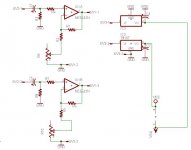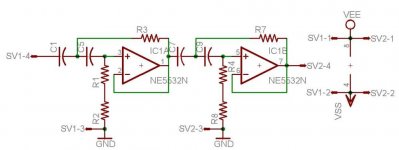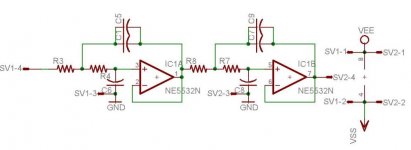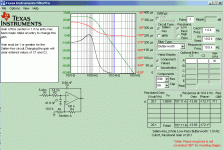Hi,
I am planning to build preamp and 4 way active filter for my two lm3886 and one lm1876 amplifiers.
here are the circuits for lowpass ,highpass and preamp.please let me know if the circuit is fine or it need some changes.
preamp will be added after active filter, the reason is, i want to adjust different gains for different drivers.
i have not planed the crossover frequencies, but have prepared the chart for different frequencies.
102.31Hz 11k 0.1uf
150.05Hz 7.5k 0.1uf
200.96Hz 5.6k 0.1uf
341.03Hz 3.3k 0.1uf
416.81Hz 2.7k 0.1uf
511.54Hz 2.2k 0.1uf
750.26Hz 1.5k 0.1uf
937.83Hz 1.2k 0.1uf
1125.4Hz 1k 0.1uf
3410.3Hz 3.3k 0.01uf
5115.4Hz 2.2k 0.01uf
Thanks
Aniruddha
Preamp Circuit
I am planning to build preamp and 4 way active filter for my two lm3886 and one lm1876 amplifiers.
here are the circuits for lowpass ,highpass and preamp.please let me know if the circuit is fine or it need some changes.
preamp will be added after active filter, the reason is, i want to adjust different gains for different drivers.
i have not planed the crossover frequencies, but have prepared the chart for different frequencies.
102.31Hz 11k 0.1uf
150.05Hz 7.5k 0.1uf
200.96Hz 5.6k 0.1uf
341.03Hz 3.3k 0.1uf
416.81Hz 2.7k 0.1uf
511.54Hz 2.2k 0.1uf
750.26Hz 1.5k 0.1uf
937.83Hz 1.2k 0.1uf
1125.4Hz 1k 0.1uf
3410.3Hz 3.3k 0.01uf
5115.4Hz 2.2k 0.01uf
Thanks
Aniruddha
Preamp Circuit
Attachments
please ignore the power supply part for NE5532 circuits in previous posts.
I will be using +/- 15V for NE5532
my plan is to have a 4 channel amplifier for one sound box,
2 channel 20Watt amplifier using lm1876 for dome tweeter and high mid speakers
2 separate lm3886 68Watts amplifiers with different power supplies for low mid and subwoofer.
crossover frequencies which i am thinking now are around 100, 800, 3000
please suggest me for this
Thanks,
Aniruddha
I will be using +/- 15V for NE5532
my plan is to have a 4 channel amplifier for one sound box,
2 channel 20Watt amplifier using lm1876 for dome tweeter and high mid speakers
2 separate lm3886 68Watts amplifiers with different power supplies for low mid and subwoofer.
crossover frequencies which i am thinking now are around 100, 800, 3000
please suggest me for this
Thanks,
Aniruddha
can somebody please explain why the input for low pass(bass) 310hz is taken from the output of 3.1khz lowpass(midrange) and not from input buffer directly in the Block Diagram of 3-Way Crossover given in
http://sound.westhost.com/project09.htm
is there any advantage in doing so? or is there any disadvantage in taking input directly from buffer?
Please help!!!!
http://sound.westhost.com/project09.htm
is there any advantage in doing so? or is there any disadvantage in taking input directly from buffer?
Please help!!!!
I haven't made one of these yet, but have always intended to, so my comments are not based on direct experience.
I'm not sure about the volume control in your pre amp.
Would it not be more sensible to have the potentiometer before the input of the opamp, rather than in the feedback loop? I wonder if all opamps are always stable with differing values of feedback (unity gain opamps may not be for instance).
Having said that, I know some people do actually do that (I think I even spotted it in my Doug Self book).
I'm sure the capacitor values are fine, if you've done your sums right. Can't really comment on it. I think you should have some gain control for each filter output though.
You're right, it is a tad odd to feed the 310Hz filter from the 3.1kHz filter output, unless the buffer output can only drive a couple of opamps, but I find that doubtful, based on the input impedance of an opamp.
You'll see a dotted line on one of the diagrams suggesting maybe that you could do either.
I'm not sure about the volume control in your pre amp.
Would it not be more sensible to have the potentiometer before the input of the opamp, rather than in the feedback loop? I wonder if all opamps are always stable with differing values of feedback (unity gain opamps may not be for instance).
Having said that, I know some people do actually do that (I think I even spotted it in my Doug Self book).
I'm sure the capacitor values are fine, if you've done your sums right. Can't really comment on it. I think you should have some gain control for each filter output though.
You're right, it is a tad odd to feed the 310Hz filter from the 3.1kHz filter output, unless the buffer output can only drive a couple of opamps, but I find that doubtful, based on the input impedance of an opamp.
You'll see a dotted line on one of the diagrams suggesting maybe that you could do either.
Hi philpoole
Thanks for the suggestions.
yes i will be using potentiometer before the opamp using the connector in the diagram.
>> I wonder if all opamps are always stable with differing values of feedback (unity gain opamps may not be for instance).
I couldn't get the exact meaning of the above sentence , may be i will have to read more about opamps, i dont think datasheet of NE5532 have something related to unity gain.
i will be more than happy if you can explain in layman terms if possible.
Thanks
Aniruddha
Thanks for the suggestions.
yes i will be using potentiometer before the opamp using the connector in the diagram.
>> I wonder if all opamps are always stable with differing values of feedback (unity gain opamps may not be for instance).
I couldn't get the exact meaning of the above sentence , may be i will have to read more about opamps, i dont think datasheet of NE5532 have something related to unity gain.
i will be more than happy if you can explain in layman terms if possible.
Thanks
Aniruddha
For instance, some opamps may have some restraints on gain (might not work at unity gain or may not be able to work at unity gain), if you have a pot in the feedback loop, then you'll be changing the gain of the opamp. Only at one point would it be at unity gain, would it be stable at other gains?
If you have the pot in front of the opamp circuit, then it makes the design less dependent on the specific choice of opamp.
Hope that helps.
If you have the pot in front of the opamp circuit, then it makes the design less dependent on the specific choice of opamp.
Hope that helps.
You can save yourself some parts count by incorporating some of the filter elements into the LM3886 or LM3875 etc -- these are opamps on steroids after all. JBL did it for a triamped consumer product. The GBW (3MHz) of the National Semi chips is sufficient to employ them this way.
Download FilterPro from Texas Instruments website -- makes the job a lot easier.
Download FilterPro from Texas Instruments website -- makes the job a lot easier.
Attachments
"These operational amplifiers are compensated internally for unity-gain operation."
Yes , that means that the ne5532 is unity gain stable.
I think you need to set the gain of your op amp to a set level and use a pot on the input to reduce the input signal. Using a pot in the feedback loop might increase distortion at different gain levels??
- Status
- This old topic is closed. If you want to reopen this topic, contact a moderator using the "Report Post" button.
- Home
- Amplifiers
- Chip Amps
- active filter and preamp qs



